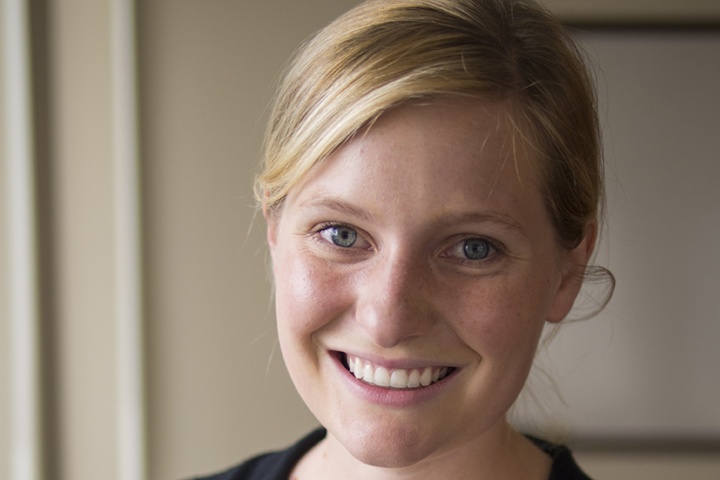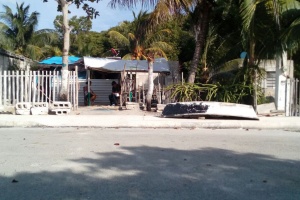An American in Paris
Doctoral student Elizabeth Dekeyser studies the sense of solidarity in Muslim communities toward the French state

Doctoral student Elizabeth Dekeyser
Photo: Daniel DeKadt
“Living here has been a lesson in the importance of bridges, whether between different concepts of nationalism and faith, or on a personal level, between different ways of communicating, working, or even eating,” says Elizabeth Dekeyser, a doctoral candidate in political science.
Moving to another country often sparks serious thinking about identity and belonging. This is doubly true for Dekeyser: She is an American in Paris, on a multi-year research project investigating the ways Islam shapes people’s sense of citizenship and allegiance to the French state.
Newcomers to France must learn to build bridges that that take into account both the country’s laws and culture, says Dekeyser. There are, for instance commonly shared ideas about what it means to be French, tacit understandings about everyday behavior: “Not greeting someone at a store or speaking loudly on a bus can be viewed as a lack of respect for society," says Dekeyser. And there is the principle of laïcité, or secularism, which occupies a central role in the French constitution.
Dekeyser is focused on the challenges faced by Muslims attempting to assimilate in France. She began her research with the hypothesis that mosques could provide crucial bridges between individuals and the state. During exploratory fieldwork, she visited a mosque where she met “an imam who quoted Rousseau on how to raise children, then two minutes later, the Koran,” she says. “I was impressed by how eloquently he wove together his French and Muslim identities and philosophies, and wondered both how common and how influential this type of thinking was.”
Conversations with Strangers
After spending the past year conducting more than 150 interviews in the banlieues (autonomous suburbs) around Paris, Dekeyser has found that “while imams and religious organizations play a big role in how people view themselves in relation to the state, ideas about religion and France don’t emanate exclusively from the mosque,” she says. “Rather, an entire ecosystem of institutions, businesses, and social groups such as the halal boucherie or community centers reinforce the importance of religious identity.”
Engaging strangers in conversation about some of the most private aspects of their lives, Dekeyser found people “quite open to talking about their faith,” she says. “They are usually excited to find that someone is interested in their experiences and after about 30 minutes, people really start to open up.”
Among the deeply felt beliefs shared by her interview subjects was that they had been rejected by the state. “This is a belief that is reinforced by very real state failures, whether poor schools or unsafe streets in immigrant neighborhoods,” Dekeyser says. “For Muslims in these communities, it is the religious ecosystem that often fills in the gap for the state.”
Dekeyser understands how religion can play a central role in an individual’s life in a multiplicity of ways. She grew up in a devout Christian family in Houston, “a beautifully diverse city,” where she says, “a tightknit, multiethnic religious community played an important role shaping everything in my life.” Whether through friends, summer camps, or an active volunteering life, Dekeyser says she observed first-hand “how religion can be all-encompassing, shaping not just social and spiritual life but political and national identity.”
Questions of religion and immigration
As a high school student, she found anti-immigrant rhetoric “very jarring,” and work in Africa cemented her desire to pursue international relations in college. “My interest in other cultures— how people are different but so similar at the same time — has always been what drives me,” she says.
Dekeyser began her undergraduate degree at Vanderbilt University, but transferred to Stanford in order to focus on nationalism in African nations. “I was really interested in the causes of instability in some countries, why some had a strong sense of national identity, and others were so factionalized that they failed.” Her undergraduate thesis on the topic won the Stanford Firestone Medal for excellence in undergraduate research, and the guidance and experience she received paved the way for her doctoral work at MIT.
Although she arrived at MIT in 2013 interested in these questions, with the encouragement of her first-year advisor, Fotini Christia, and graduate student office mates (one Jewish, one Muslim), she turned her attention to questions of religion and immigration. Then came the terrorist attack on Charlie Hebdo, the French weekly satirical magazine. This proved a decisive moment for Dekeyser, who seized on a surprising research goal: “I wanted to understand what sorts of environments undermine the evolution of terrorism, not to understand where terrorists come from.”
In pursuit of this goal, Dekeyser is not merely conducting large-scale ethnographic interviews, but analyzing vast troves of French Twitter feeds, search results, Google maps data, and review websites looking at French Muslim communities’ varying responses to terror attacks and how this correlates with local-level religiosity and attitudes toward the state. This data is all geographically sourced, so she can pinpoint the locations of users and connect them to likely neighborhood mosques, organizations, crime rates, and businesses.
Data analysis, together with ethnographic research, will enable her to create a dynamic portrait of Muslim attitudes toward citizenship in France, and the key factors shaping those attitudes.
Healthy communities
Dekeyser is still in the process of writing her dissertation but she has already identified some potential policy applications of her research. Local governments as the primary representative of the state play an important bridging role in helping Muslims feel included as citizens, she has observed.
A local government can make choices about whether cafeterias serve halal food, how headscarf bans are enforced, or even whether mosques have access to free or inexpensive land in the same way that Christian churches do. These policies, she argues, have an important effect on how individuals reconcile their national and religious identities.
Yet she has observed that it is not solely religious policies that matter. Rather, towns in which Muslim communities appear to feel most integrated “offer effective policing, urban renewal projects, and lots of grassroots engagement celebrating ethnic, not just religious, diversity, such as Malian dancing demonstrations or Algerian movie festivals,” she says.
“I firmly believe that when people have a sense of community that goes above religion—when they feel accepted by the community where they buy groceries, go to school, there will be less anger toward the state and, possibly, less motivation to join terrorist or other anti-state movements.”
